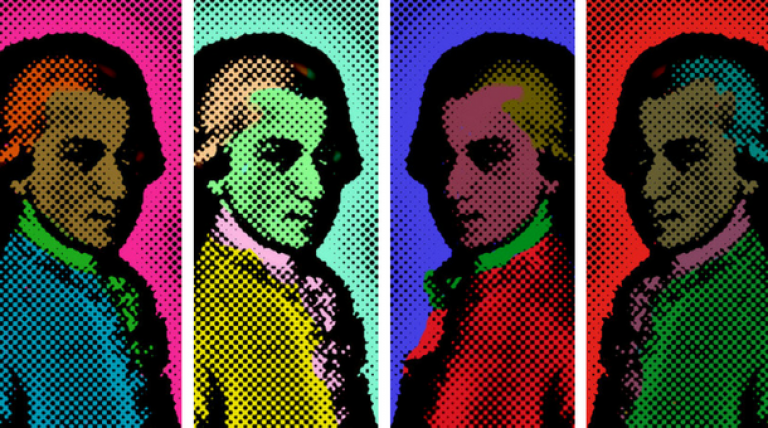On trial: Mozart and other pirates
01 June 2017, 6:00 pm–7:30 pm

Event Information
Open to
- All
Organiser
-
UCL Institute of Brand and Innovation Law (IBIL)
Location
-
UCL Cruciform Building, Gower Street, London WC1E 6BT
On trial: Mozart and other Pirates
The distinguished conductor and harpsichordist Christophe Rousset will be conducting Mozart’s early opera Mitridate, re di Ponto at the Royal Opera on 26 and 29 June and 1st and 7 July. Mozart was not quite 15 when he wrote it. But did he copy, borrow, quote, or plagiarise (words which mean the same but carry different overtones) too much? Maestro Rousset, who has spent 25 years with his ensemble Les Talens Lyriques exploring and championing the music of Mozart’s forgotten contemporaries (Salieri, Paisiello, Jomelli), will discuss and illustrate with examples what Mozart and others did in an age where there was no copyright.
Suppose modern copyright law had applied then. Would Mozart have been an infringer – a “pirate” as the old-fashioned word has it? Modern instances of infringement or alleged infringement will be played for discussion with the audience and comparison with what Mozart did.
This will be discussed by the panel, as will a further question. Suppose Mozart had embellished what he took to the point of a new creative work, should he have a defence? Do the extreme reaches of modern copyright law actually threaten the creative process? Should there be a defence of “transformation” for artistic works – especially musical and visual works?
Speakers include:
- Christophe Rousset (Founder and leader of Les Talens Lyriques and scholar of the Baroque and Classical pre-Romantic periods)
- Professor Sir Robin Jacob (Hugh Laddie Professor of Intellectual Property Law, UCL)
- His Honour Michael Fysh QC SC (Former Chairman of the Copyright Tribunal and Judge of the then-called Patents County Court)
About Christophe Rousset
Christophe Rousset who will make his debut at the Royal Opera House conducting Mozart’s early opera Mitridate in June, has spent 25 years with his celebrated ensemble Les Talens Lyriques exploring the music of Mozart’s overlooked contemporaries – Salieri, Paisiello, Martin y Soler, Jomelli and more. From rediscovering and championing this forgotten music, Rousset has been able to pin-point exact examples where Mozart copied music of his contemporaries. Was he copying, borrowing, quoting or plagiarising? If modern intellectual property laws applied then, would Mozart have been an infringer, a pirate?
From recordings of Mozart’s Mitridate, Idomeneo and Don Giovanni, Rousset will compare examples from operas by Salieri, Jomelli and Paisiello. Judges Fysh and Jacob will present modern examples of infringement or alleged infringement to enable the audience to put Mozart on trial and pass judgement. Suppose Mozart had embellished what he took to the point of a new creative work, should he have a defence?
Distinguished opera critic David Cairns said of Mozart that he “had an extraordinary capacity…for seizing on and assimilating whatever new style (was) most useful to him.” Mozart claimed in a letter, “as you know, I can more or less adopt or imitate any kind or style of composition.” At an impressionable age Mozart travelled extensively across Europe being presented to every royal court and was exposed to the music of the greatest composers of his day. Not only did he had a capacity to assimilate but also to perfect and innovate.
Mozart wrote Mitridate, re di Ponto for Teatro Regio Ducale of Milan when he was not quite 15. He had made earlier attempts at opera with Apollo et Hyacinthusand the German singspiel Bastien und Bastienne but this was his first opera commission in Italy and it has hoped that this could open doors to a permanent position. Wanting it to appeal to the tastes of his Italian audience, he looked to other successful operatic examples such as Jomelli’s Armide Abbandonato, which he had heard in Naples in 1770. “Beautiful but too serious and old-fashioned for the theatre” wrote Mozart to his sister so he decided to improve on that by “stealing” an idea and putting his hallmark on it. Mozart perfected Mitridate over 5 months, writing dazzling arias for the star soloists, which tests today’s greatest singers. The successful premiere dispelled any scepticism about Mozart’s prodigious talents and Mitridate run for a further 21 performances.
25 years ago Christophe Rousset created the soundtrack to the film Farinelli, which sold more than a million CDs worldwide and his ensemble Les Talens Lyriques on the international stage. He followed this with a critically-acclaimed recording of Mozart’s Mitridate with a then-fledgling cast including Cecilia Bartoli, Natalie Dessay, Juan Diego Florez, Sandrine Piau and Brian Asawa. For the revival of Graham Vick’s production at the Royal Opera House, which the Guardian described as a “milestone in the staging of 18th century opera”, Rousset returns to Mozart’s early opera with another stunning cast including Michael Spyres in the title role alongside Albina Shagimuratova, Bejun Mehta, Lucy Crowe and Andrew Tortoise.
This season Rousset brings his Les Talens Lyriques three times to the UK. The next appearances will be for Monteverdi’s Madrigals at Brighton Festival in May and a programme entitled Zefiro torna dedicated to Monteverdi’s tenor duets at St John’s Smith Square in June.
Watch the film of the event
Queries
Please email the UCL Laws events team on laws-events@ucl.ac.uk
 Close
Close

